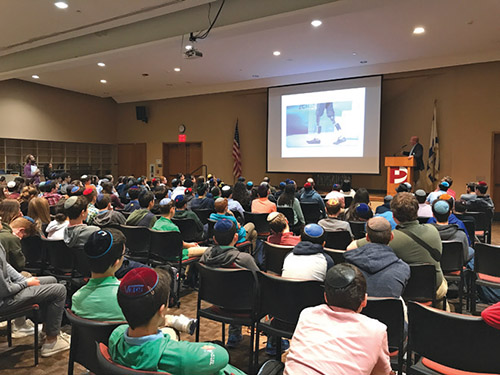

Yeshivat Frisch’s engineering program welcomed Professor Alon Wolf, founder and director of the Biorobotics and Biomechanics LAB (BRML) in the Technion Faculty of Mechanical Engineering, for a guest lecture on October 25 about “The Past, Present and Future of Robotics.” All freshmen and sophomores in Frisch’s engineering track attended the lecture and had the opportunity to ask questions afterwards.
Wolf’s lecture introduced students to some of the cutting-edge research the Technion Institute of Technology has spearheaded in the fields of biokinetics, medical/surgical robotics as well as search and rescue robotics. For example, Wolf discussed how his team closely observes and mimics the movements of different animals to solve complex problems that affect humans. The slithery maneuvering of snakes inspired the team to develop robots that conduct search and rescue missions under rubble—first used in the aftermath of the 9/11 terrorist attacks—as well as new surgical robots that carry out procedures more accurately and less invasively than ever before.
“What I found interesting is that the Technion sees things in a way that not many people can see,” said Frisch sophomore Evan Haimm. “For example, they saw the modern technique of a ‘minimally invasive surgery’ and deemed it as not so minimally invasive. They came up with the idea to use a snake-like robot and insert it through just one small incision, rather than four or five. Professor Wolf’s lecture taught me that by using the technology available to us in Frisch’s engineering lab, we can solve global issues.”
Wolf also showed the students brief video clips of Technion technology in action, such as “exoskeleton” robots that let paraplegics walk upright, and “bionic” limbs—prosthetic hands, arms and feet that are connected to the nervous system and whose movements are controlled directly by the brain. “We’re at the beginning of a very big revolution,” said Wolf, discussing the ethics involved. “We have in our hands a lot of technology, but we have to ask ourselves how to use it.”
The lecture marked Frisch engineering’s second Israeli-connected event this year. On September 14, a delegation of Israeli computer science students from Orot Yoqneam High School visited Frisch for the day, led by Israeli high tech industry veteran Danny Benishay. The delegation observed five top high school engineering programs in the United States, of which Frisch was the only yeshiva high school. During the visit, the American and Israeli students had the opportunity to work together to solve an engineering problem, and Frisch engineering students presented some of their recent projects—from a machine that transcribes speech for individuals affected by ALS to a “Snoozaloon” device that replicates calming environments for children with sensory disorders.
“Israel is a leader in technology, and the importance of STEM education is universal,” said Frisch Engineering Program Director Rifkie Silverman, expressing appreciation to Frisch parent Anat Feinberg, who works with the American Technion Society and helped coordinate both events.
“Something for you to think about is that if you’re studying computer science, you certainly can change the world and have a huge impact on the lives of others,” Silverman told the students.
Frisch’s engineering program includes courses in the foundations of engineering, applied engineering, computer science and robotics, as well as numerous extracurricular opportunities, including Coding Club, Girls Who Code and a senior elective that pairs students with a family that has a particular need, and challenges the students to solve that problem through engineering.









